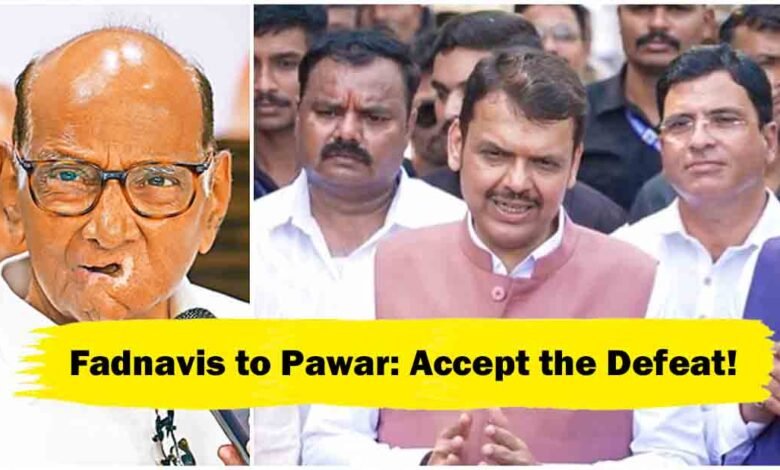
Devendra Fadnavis’s Stern Reply to Sharad Pawar on Assembly Defeat
Maharashtra Chief Minister Devendra Fadnavis has sharply criticized Nationalist Congress Party (NCP) leader Sharad Pawar, advising him to accept the people’s mandate in the recently concluded Assembly elections. Fadnavis’s comments come in the wake of Sharad Pawar’s visit to Markadwadi village in Solapur district, where the latter called for a resolution against the use of electronic voting machines (EVMs) and demanded a return to traditional ballot-paper voting.
The Assembly elections resulted in a decisive victory for the Mahayuti (Grand Alliance), comprising the Bharatiya Janata Party (BJP), Shiv Sena (Eknath Shinde faction), and NCP (Ajit Pawar faction), with the coalition securing a significant majority. Following this, Devendra Fadnavis was sworn in as Chief Minister, while Eknath Shinde and Ajit Pawar assumed the roles of Deputy Chief Ministers.
However, the Mahavikas Aghadi (MVA), an alliance of the Shiv Sena (Uddhav Thackeray faction), Congress, and NCP (Sharad Pawar faction), raised concerns over the election results, questioning the reliability of EVMs. The call for a return to ballot-paper voting has gained traction in Markadwadi, where villagers passed a resolution demanding the old voting method.
Addressing the controversy, Devendra Fadnavis stated, “Sharad Pawar should listen to the people and not be misled by activists and leaders who spread false narratives. As a senior leader with over 50 years of political experience, it is expected of him to gracefully accept the people’s verdict.”
Fadnavis added that questioning EVMs and calling for ballot-paper voting without substantial evidence undermines public faith in democracy. “The people have made their decision. Leaders of such stature must demonstrate patience and uphold democratic values. In his heart, even Sharad Pawar knows the reality of the defeat,” he remarked.
The Chief Minister’s response underscores the need for opposition leaders to reflect on their electoral strategy rather than casting doubts on the democratic process. Fadnavis also hinted that internal pressures within the MVA might be influencing Sharad Pawar’s actions, emphasizing the importance of responsible leadership in such times.
Sharad Pawar’s visit to Markadwadi and his subsequent statements have reignited debates about electoral reforms and the credibility of EVMs. While the Grand Alliance appears to be consolidating its position in the state, the opposition’s focus on procedural controversies reflects its ongoing struggle to regain political ground.




